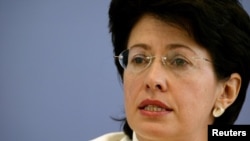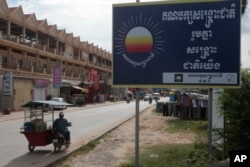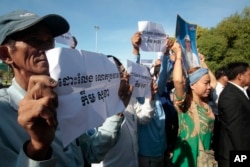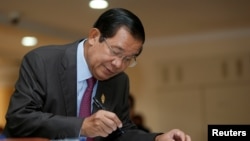The vice-chair of the European Union Subcommittee on Human Rights says her union needs to react “very soon” with concrete actions in response to what she characterized as the Cambodian government’s moves to dissolve the country’s main opposition party.
The comments by EU parliamentarian Barbara Lochbihler come as Sweden said Thursday it would rethink its engagement with Cambodia if the government proceeds with its steps to dissolve the opposition Cambodia National Rescue Party (CNRP).
Trade sanctions an option
Targeted sanctions or even suspension of preferential access to Cambodia’s biggest export market are among the options the union must consider now, Lochbihler told VOA.
“In Cambodia they could say ‘yes, well we have the support of the Chinese government, why do we care about the EU?’” she said.
“But then if you look clearly, you can see that the EU is the biggest export market for Cambodia. So I think they take this into consideration, and also personally I think if the European Union would go a step further and put specific, targeted sanctions against individuals in the government, governments and representatives of governments are sensitive to this.”
Cambodia exported more than $5 billion worth of products in 2016 to the European Union, which gives the country preferential access to its markets under the Everything But Arms program.
Many Cambodian government officials also frequently travel to EU nations such as France to visit family in large diaspora communities.
Lochbihler said she would urge her parliamentary colleagues to “look at the option to proceed with an investigation under Everything But Arms and product-and-sector-specific suspensions, which we can do under Article 15 of the general system of preferences.”
Cambodia’s EBA with the EU is already under scrutiny because of a furor that arose from forced evictions perpetrated by a ruling party senator who has exported large volumes of sugar to the single market.
Lochbihler said she had written to EU Trade Commissioner Cecilia Malmström requesting she examine why the Cambodian government had not signed the terms of reference for an audit process the two parties agreed to have drafted in an effort to resolve the dispute.
Meeting with opposition lawmaker
Her comments came after meeting deputy opposition leader Mu Sochua on Friday. Mu Sochua fled Cambodia last week saying she had been told her arrest was imminent.
The party’s leader, Kem Sokha, has been jailed on treason charges, and about half of his party’s lawmakers have fled the country.
The Cambodian government has launched a coordinated political assault on the opposition, independent media outlets and civil society, using a conspiracy narrative alleging a U.S.-backed plan to overthrow the regime as grounds for arresting or silencing a constantly widening net of critics and opponents.
Opposition leader in jail
Government mouthpiece Fresh News, which consistently broadcasts imminent ruling party actions, cast that net further Thursday with an anonymous letter to the editor alleging George Edgar, the head of the EU delegation, had crossed a “red line” by pushing for the release of Kem Sokha, the jailed opposition leader.
Edgar told The Phnom Penh Post in response that though EU member states had expressed serious concern over Kem Sokha’s arrest, the body itself remained nonpartisan.
Council of Ministers spokesman Phay Siphan said the EU needed to consider if it wanted to retain Cambodia as a development partner when considering whether to “sanction or not sanction.”
“Well, they have a right to do anything. Remember Cambodia’s not a terrorist state. We [do] not produce nuclear,” he said.
On Monday, Cambodia’s National Assembly passed amendments that would redistribute the opposition’s seats almost entirely to the ruling party at the commune level and to other largely pliant parties at the national level.
A complaint filed by one of those parties requesting the dissolution of the CNRP for planning to overthrow the government is currently before the courts.
Sweden weighs in
On Thursday, Swedish Human Rights Ambassador Annika Ben David foreshadowed the consequences if the court dissolves the CNRP at a news conference in Phnom Penh.
“I have stressed to a representative of the government of Cambodia that should the Cambodia National Rescue Party be dissolved, this will force my government to rethink our engagement in Cambodia.
“We think that it is in the country’s long-term interest to open the democratic spaces as it used to be and to return to freer conditions and less restrictions for media and civil society to all operate,” she said.
Cambodia’s impressive economic growth could be hurt by the current political situation, she added.
“And I also expressed my concern that the developments here now could give rise to a negative image of the Cambodia globally, so the restriction of civil and political rights currently; the recent developments could send a negative signal to investors, consumers, business partners abroad, which could be hurtful for the Cambodian economy,” she said.
Prime Minister Hun Sen, who has ruled for more than three decades, faces a national ballot next year after losing almost a third of Cambodia’s commune seats in local elections earlier this year to the CNRP.










